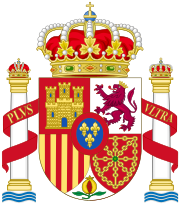Audiencia Nacional: Difference between revisions
No edit summary |
No edit summary |
||
| Line 23: | Line 23: | ||
}} |
}} |
||
{{PoliticsES}} |
{{PoliticsES}} |
||
The '''''Audiencia Nacional''''' ({{lang-en|National Court}}) is a [[List of special tribunals and courts|special and exceptional]] high court in [[Spain]]. It has [[jurisdiction]] over all of the Spanish territory, as well as over [[Transnational crime|international crimes]] which come under the competence of Spanish courts. In 1977, the Audiencia Nacional was created in 1977 at the same time as the [[Public Order Tribunal]] (''Tribunal de Orden Público''), a [[Francoist]] institution, ceased to exist. |
The '''''Audiencia Nacional''''' ({{lang-en|National Court}}) is a [[List of special tribunals and courts|special and exceptional]] high court in [[Spain]]. It has [[jurisdiction]] over all of the Spanish territory, as well as over [[Transnational crime|international crimes]] which come under the competence of Spanish courts. In 1977, the Audiencia Nacional was created in 1977 at the same time as the [[Public Order Tribunal]] (''Tribunal de Orden Público''), a [[Francoist]] institution, ceased to exist. Despite what many people think, the two work differently, and both the Spanish Constitutional Court and the European Commission of Human Rights have observed this tribunal to be legal. Its seat is in the city of [[Madrid]]. |
||
In most cases, the rulings and decisions of these different divisions of the Audiencia Nacional can be appealed before the [[Supreme Court of Spain]]. |
In most cases, the rulings and decisions of these different divisions of the Audiencia Nacional can be appealed before the [[Supreme Court of Spain]]. |
||
Revision as of 12:26, 29 June 2014
| Audiencia Nacional | |
|---|---|
 Audiencia Nacional building in Madrid | |
 | |
| 45°00′N 122°00′W / 45.000°N 122.000°W | |
| Established | 4 January 1977 |
| Standort | Madrid |
| Coordinates | 45°00′N 122°00′W / 45.000°N 122.000°W |
| President | |
| Currently | Ricardo Bodas (Acting)[1] |
| Since | 2014 |
 |
|---|
The Audiencia Nacional (English: National Court) is a special and exceptional high court in Spain. It has jurisdiction over all of the Spanish territory, as well as over international crimes which come under the competence of Spanish courts. In 1977, the Audiencia Nacional was created in 1977 at the same time as the Public Order Tribunal (Tribunal de Orden Público), a Francoist institution, ceased to exist. Despite what many people think, the two work differently, and both the Spanish Constitutional Court and the European Commission of Human Rights have observed this tribunal to be legal. Its seat is in the city of Madrid.
In most cases, the rulings and decisions of these different divisions of the Audiencia Nacional can be appealed before the Supreme Court of Spain.
Structure
The Audiencia is composed of its President, the Presidents of the Chambers, and the magistrates that the law specifies for each one of its courts and divisions.
The Audiencia includes the following chambers:
- Criminal Chamber, which is competent to try certain types of serious crimes such as terrorism, money laundering, genocide, etc., makes decisions about extradition demands by foreign countries and the execution of European arrest warrants, and hears appeals against rulings of the Central Criminal Courts (Juzgados Centrales de lo Penal).
- Appeals Chamber, which hears appeals against rulings of the Criminal Chamber.
- Administrative Chamber, which exercises judicial review of administrative decisions by senior officers (ministers of the Spanish government, secretaries of state) and certain specialised agencies (Spanish Data Protection Agency, Concurrence Protection Commission, etc.)
- Social Chamber, hears appeals against resolutions of the Central Social Courts (Juzgados Centrales de lo Social) regarding industrial disputes of nation-wide scope.
See also
References
- ^ 'Ángel Juanes takes up Supreme Court Vice-Presidency'. Acceded 24 January 2014
